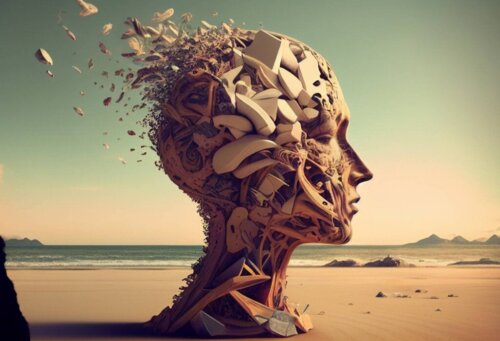Emotional dependency is an unhealthy pattern of behavior and attachment in which one person is heavily dependent on another person to meet their emotional needs and feel complete. It doesn’t occur only in romantic relationships, as it can manifest itself in different ways, affecting any type of interpersonal bond.
This dependency varies in intensity, as a study shared by the journal Ansiedad y Estrés points out. Some people have only a few signs, while others show a more complete pattern. Either way, such behavior gives rise to the development of harmful relationships that affect different areas of life. In the following article, we’ll explain more about it.
How can emotional dependency affect interpersonal relationships?
Emotional dependency not only affects the dependent person, but also their partners, friends, or acquaintances. It generates stress, emotional exhaustion, and difficulties in communication and the establishment of a balanced relationship. The effects are expressed in the ways that we’re now going to explain to you.
Lack of autonomy
People who are emotionally dependent need their partners or friends to a great extent for their sense of identity, validation, and happiness. This can lead to a lack of autonomy and a constant need for attention and approval. As a result, one’s own needs and desires are neglected, leading to relationship strains.
An essay with university students published in the journal Universitas Psychologica identified that dependency causes clinging and attention-seeking behaviors, which lead to the modification of plans and decisions. Therefore, the dependent person revolves around another person, abandoning their autonomy.
Insecurity and jealousy
Emotionally dependent people are often accompanied by insecurity and fear of abandonment. These people have difficulty trusting their partners or friends and tend to experience intense jealousy.
In fact, there’s a close link between this type of dependency and intra-family relationships that cause conflicts and an atmosphere of mistrust, according to a thesis published by the César Vallejo University.
The manifestations of this, according to research by the Konrad Lorenz University Foundation, are an excessive fear of separation and loneliness, as well as the incessant request for expressions of affection. In the worst cases, jealousy and insecurity trigger various forms of violence.
Excess demands
Emotionally dependent people have excessively high expectations of their partners or friends. They demand constant attention, affection, and support, which may place a heavy burden on the other person. In turn, it causes irrational beliefs, and one of them is the need for perfectionism. This is likely to lead to burnout and resentment in the relationship.
Loss of individuality
The loss of individuality in a relationship is another effect of dependency. People become emotionally fused with their partner or friend, losing sight of their own interests, goals, and passions.
This leads to a feeling of lack of personal satisfaction and limits individual growth within the relationship. This blurred individuality in the dependent person, according to a work disseminated by the Comillas Pontifical University, makes it impossible for them to strengthen their self-esteem. On the contrary, attachment and the exaggerated need for affection increase.
The cycle of toxic relationships
Dependent people often have difficulty setting healthy boundaries and end up tolerating harmful behaviors. They may stay in abusive or dysfunctional relationships due to their fear of loneliness or abandonment. This results in a cycle of toxic and damaging relationships.
A study from the Technical University of Ambato details that dependency impairs family functionality. The dependent person remains in toxic relationships, as their attachment becomes almost an addiction that plunges them into states of sacrifice and submission.
Why may a person be emotionally dependent?
There’s no absolute consensus on its causes and risk factors for emotional dependency. However, we can highlight the following aspects:
- Family patterns: If dependent interpersonal relationships have been observed in the family of origin, a person is more likely to develop similar patterns in their own relationships.
- Low Self-Esteem and Self-Criticism: Those who experience low self-esteem have a greater need to seek external validation and need others to feel valued and accepted.
- Personality factors: Some traits, such as anxiety, insecurity, and conflict avoidance are associated with the formation of dependent relationships and make it difficult to develop emotional autonomy.
- Insecure attachment bonds: Studies such as those of MLS Psychology Research suggest that insecure attachment ties in childhood, such as anxious or ambivalent attachment, increase the risk of developing emotional dependency in adulthood.
- Traumas and Emotional Abuse: Traumatic, abusive, or emotional deprivation experiences in childhood or in past relationships contribute to this dependency, notes an article in Behavioral Psychology/Psicologia Conductual. These harm self-esteem and the ability to establish relationships based on trust and mutual respect.
These factors don’t act in isolation but rather interact with each other and with other individual and environmental aspects to influence emotional dependency. Research in this field is an active and evolving area. However, more studies are needed to fully understand the risk factors and underlying causes.
Why is it important to seek professional help if you suffer from emotional dependency?
If you’re emotionally dependent, it’s vitally important that you seek professional help for the following reasons:
- Self-knowledge: You understand your patterns and their origins. A professional helps to identify unhealthy beliefs and behaviors, as well as to explore emotions and past experiences that affect your dependency.
- Personal Development: By working with a therapist, you learn to cultivate higher self-esteem and develop a stronger self-identity. A therapist can also help you set healthy boundaries, make independent decisions, and take proper care of yourself.
- Breaking the cycle: By not addressing it adequately, dependency becomes a recurring pattern in relationships. Psychological therapy makes it easier to break this cycle and offers tools to avoid falling into dependent relationships in the future.
- Healthier relationships: Therapy allows you to establish balanced interpersonal relationships based on mutual respect. Likewise, you develop assertive communication skills, learn to express your needs appropriately, and receive emotional support in a healthy way.
- Emotional well-being: A professional can teach you to develop emotional self-regulation and promote your general well-being. In fact, a study found in young adolescents that the appearance of emotional dependency is linked to lower psychological well-being (Alarcón, 2019).
Overcome emotional dependency and heal interpersonal relationships
“Having emotional independence means we are no longer tied to the need for constant approval and are, therefore, not coerced into doing more than we feel comfortable doing by our need to please others.”
-Sue Thoele-
Psychological support is essential for your well-being and personal development when you suffer from dependency. A mental health professional provides the tools to overcome this situation. The process takes time and effort, is gradual, and requires commitment.
Finally, it’s essential to surround yourself with a healthy environment during the process. With time and proper attention, it’s possible to improve emotional dependency and build satisfying interpersonal relationships.
The post How Does Emotional Dependency Affect Interpersonal Relationships? appeared first on Exploring your mind.



















Comments